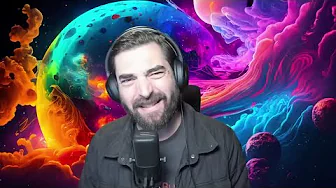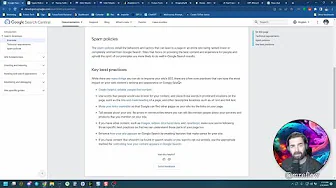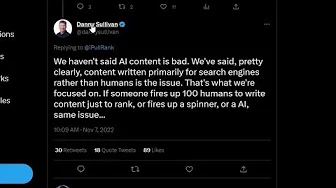Intro

In this video, I'm going to show you how to get around the various AI GPT-3 detectors that are out there. This has been one of my most requested videos, so let's get into it. Now before we get into how to actually get around these various AI chat GPT detectors, I think it's important to discuss why you want to get around these AI detectors because chances are you don't really need to worry about it.
Googles spam policies

And here's what I mean by that. If you're trying to get around it for SEO purposes, it's not really a problem. And I'm going to prove it to you in this video. First off, let's take a look at Google's Search Central documentation. If you come down here and we read about their spam policies and their best practices, it basically says they're looking for you to create helpful, reliable, people-first content. So people-first content refers to content that was designed to be read by humans, not content that was designed to get ranked in the search engines. There is nothing here in their documentation that says that you cannot use AI content or they're going to penalize AI content. Now let's click into their spam policies here. If you read their spam documentation, there is actually a section, if I scroll down far enough, that discusses spammy, automatically generated content. Their definition is content that's been generated programmatically without producing anything original or adding sufficient value.
Instead, it's been generated for the primary purpose of manipulating search rankings and not helping users. And then it gives some examples of spammy, auto-generated content. So text that makes no sense to the reader, AI content typically makes sense. Text translated by an automated tool without human review. Text generated through automated processes without regard for quality or user experience.
Text generated using automated synonymizing, paraphrasing, or obfuscation techniques. Obfuscation? Obfuscation. Text generated from scraping feeds or search results or stitching or combining content from different web pages without adding sufficient value. So basically what they're saying is if you're creating content that is just keyword stuffed content that's not very great for the reader, yeah, they're going to slap you down for that. But that's not the type of content that AI generates. Now you don't even have to take my word for it.
Googles response

Let's take a look here at this tweet from Danny Sullivan. Let me hover over his name here. Danny Sullivan, he's Google's search liaison, helping people understand search and Google hear feedback. Here's what he said. We haven't said AI content is bad. We've said pretty clearly content written primarily for search engines rather than humans is the issue. That's where we're focused on. If someone fires up 100 humans to write content just to rank or fires up a spinner or an AI, it's the same issue. This is somebody from Google saying they don't have a problem with AI content as long as it's got value for humans. He goes on to say, " We did talk about a focus on content by people for people in our post about improvements like the helpful content system, but the nuance is really that it's unlikely some AI content is going to feel written by people without some degree of human review". Further, he says, So if you're an SEO trying to figure out how AI fits in with being successful or not on Google, you're too focused on the tool, not the content. Is the content you're producing helpful, reliable, and people first in nature? That's what we're looking for. So he's reaffirming the fact they don't care if you used AI to generate the content. They just care that the content is valuable and helpful to the people that find the content. Here's a message over on Mastodon from John Mueller. John Mueller is the search advocate/developer relations at Google. So this is somebody that works at Google as well. He says, I don't know if AI is the right approach to making titles and descriptions, but if you're running out of ideas, and especially if you see pages showing up in search for the wrong terms, it seems like a good way to get inspiration or to try new things out. I would strongly discourage blindly following it though. You know your audience much better than any tool. So this is somebody that works at Google saying that they actually believe that using AI to generate titles and descriptions is a good use of AI. And now I'm going to finish off with some anecdotal evidence here.
Traffic stats

These are the traffic stats from futuretools.io for the last 28 days. If you're not aware, most of what's on the Future Tools website was generated with AI. If I click into any one of these tools here, this description here was written with AI. And these pages are ranking in Google right now. Google is my third largest traffic source, generating 142,000 sessions in the last 28 days. This is Google organic search traffic coming to my site that was generated mostly by AI. I need to reiterate that if the reason you're trying to get around these AI detectors is for SEO purposes, you're probably wasting your time right now. Now saying all that, a lot of AI detection software has popped up, so much so that I created a whole category on Future Tools just for AI detection software. Now let's say you're not trying to do this for SEO purposes.
I still think you're wasting your time. Here's why. These detectors don't work very good. I'm not trying to click bait you into this video. I will show you some tricks to get around them. So I'm going to focus in on three different AI detectors right now. Okay. I'm going to focus on originality.ai. This is one that's actually pay to use and I have some credits, so might as well experiment with it. I'm going to show you AI cheat check, which is one that's been just all over the news lately. And finally, OpenAI themselves, the company that created ChatGPT and GPT-3 Playground, they released their own AI detector and we'll test with the one that actually came straight from OpenAI here. So to start, let's write some content completely with AI. So let's jump over to ChatGPT here and have it write a short story for us. Write a short story that's at least a thousand characters, since that's how long it needs to be for these AI detectors to really accurately detect about a kid who likes to skateboard. All right. So it wrote us our story. Let's go ahead and copy this all over here and we'll bring it over to originality.ai, paste it in and let it scan. And look at this, 89% original, 11% AI. You just watched we generate this with AI right now, and it's saying that it's 89% original. So when it comes to storytelling, we know that this one isn't super accurate. It's claiming it's original. Let's check out that same story inside of AI cheat check here. I'll paste this into this one. Let's run it through this platform. This one actually says 100% certain the text was written by AI. So we're already getting mixed results between two different scanning platforms. Now let's plug it into the OpenAI official text classifier. We'll paste this in here and let's go ahead and submit it. The classifier considers this text to be possibly AI generated. So it doesn't know. So let's go ahead and make a new story here. Let me hit new chat at the top. This time let's have it write something that's nonfiction. Explain to me in at least a thousand characters how to grow avocados in my backyard. All right. So we got instructions on how to grow avocados. Let's go ahead and copy all this here and jump over to originality.ai and start a new scan. We'll paste this in and scan now. All right. So our nonfiction of how to grow avocados is 73% original and 27% AI working great. Let's jump over to our AI cheat check here. Let's delete everything here and let's paste it into this one. Let's check this out. All right. So this one, 81% certain the text was written by AI. So this one's fairly confident that it was written by AI. Let's check out once again, open AI's platform and let's go ahead and paste this in here. Let's submit it and see what it says. The classifier considers this text to be unclear if it is AI generated. I literally used open AI's tool to generate this content with AI and open AI's platform is saying it's unclear if it's AI generated. So the point that I'm trying to make here is that these tools don't actually work that well for figuring out if what you created was actually AI or not. So even outside of the SEO purposes, these tools are still not very good at accurately predicting AI written content. Now let's try to get something that it does say it's AI and I can fulfill on my promise from the title of this video that I'll show you how to get around these, even though why do you need to? Let me start a new chat up here, right? An article that's at least a thousand characters about the invention of the telephone. All right, let's go ahead and let it generate that. All right. So we have the article. It's at least a thousand characters. Let's go ahead and copy this whole article here and let's bring this over to originality.ai and scan it. So this one, it actually says is a hundred percent AI. So it got it right. Finally. Now, again, even if it does say something's a hundred percent AI, I don't believe anybody could 100% argue that this detector works because we've already proven that it gives false negatives and false positives. So let's go ahead and jump into AI cheat check. Let's test this one.
I'm 100% certain the text was written by AI and then let's test with open AI's official one here. And this one actually says unclear if it's AI generated. So open AI official is probably the least reliable of the available ones. So let's not even bother with this one anymore. Let's see if we can get originality.ai to see this article as at least a lot more original than it is before. And same with AI cheat check. So if you come over to future tools, there's actually inside the AI detection, a tool called GPT minus one, and it says it's a tool that tries to fool AI chat detection. So let's go ahead and check this tool out and see how well this one works. So we've got our original article that we just copied over. Let's paste it in here now and let's submit it and let's see if this tool works very well. All right. So what it did was it reworded some of the stuff and it used some various synonyms to change words throughout it. So let's take this new version here that it just created. We'll copy it. We'll jump into originality.ai. We'll start a new scan here. Let's paste this new version in. All right. Now it says it's 99% original. So this GPT minus one, that's the tool that will do it. Let's pull it into AI cheat check here. Delete our original article, paste this in, check it out one more time. 100% certain this text was generated by a human. So GPT minus one, which you can find over on future tools, will change a few of the words throughout the article that you wrote and turn it into something that the chat detectors now believe is human generated. Another thing you could try is you could take this original article here. Let's copy this, jump back over to future tools. Let's look inside the copywriting section where there's a whole bunch of article writers. I'm going to filter it down just to my pick. So it narrows it down to just a handful and let's try Quillbot. Let's paste our article in here and it's saying it's a little too long. So I'll just do it in a couple of chunks here. So I'll take the first three paragraphs, paraphrase these using Quillbot and it sort of reworded it for me.
So let's go ahead and copy these first three paragraphs and we'll paste them in, but that's not the whole article. So let me go grab, that was just the first three. Let's go grab the next two paragraphs here. Copy these to have it paraphrase these two paragraphs and it did some rewording. So I'll grab these, copy them, bring them into originality here, and then we'll grab our final two paragraphs here. Copy them, pull them into Quillbot, paste these two in, paraphrase these two final paragraphs. All right. And now it reworded those two paragraphs. So let's go ahead and copy those, pull it into originality here, paste it. Now we have a rewritten version of pretty much the exact same article we had originally. Let's scan this one. A hundred percent original. Let's go ahead and copy this whole version, this new version that it created here, pull it into AI cheat check here, paste this new version in, do a check. 99% certain this text was generated by a human. So there you go. There's two tools that you could use right there to take your AI and get the cheat checker tools to make it think it's a human. You got GPT minus one, which you can find over on the future tools under the AI detector section and you've got Quillbot, which will reword anything you wrote and also do the same thing.
But again, I want to ask why you don't really need to do this. It's not an issue with SEO. As long as the content is readable and valuable to humans, then it doesn't matter. You can actually use AI content. Google doesn't care.
Just make sure you review it and you don't copy and paste junk that humans wouldn't want to read. And if you're trying to get around it for other reasons, also it's shouldn't be that big of a deal because these AI detectors, these GPT detectors can't be trusted anyway. Now that's not to say it's never going to be an issue over time. These detectors will get better and better. I would imagine open AI's internal detectors going to get better and better because they're the ones building the technology that's writing a lot of the chat right now and in the future, Google may change their policies on how they feel about AI content. I highly doubt it. I think Google's main purpose is to put the most relevant, most valuable content in front of people. They don't care if it was written by a human or a robot, as long as it's valuable. As long as somebody goes to Google, searches a search term, clicks on a link, and then stays on that link because it was what they were looking for. It was the value they came to find.
It had the information that they were going for. Then Google is going to put that content towards the top, AI or not. That's just how SEO works. They're trying to put the most relevant result for the search query in front of people. And as long as the AI content that you're using is relevant and valuable and has information that people are looking for, it can rank and it likely always will. And besides that, Google is going to implement their own AI bots into Google search soon. It's been announced. It's in the news right now. So they really can't be anti-AI because they're going to be part of the AI movement. I'm getting all worked up about this, but all this to say, don't stress about AI detectors. They're not a big deal.
They're not an issue. And if you like nerding out about AI, make sure you check out futuretools.io. This is the site where I curate all of the cool tools that I come across, even AI detectors and tools that'll rewrite your content for you if you're still worried about the AI chat detection. And I've also got a really cool free newsletter that you can jump on. It just passed 15,000 subscribers today. So freaking cool. I look at all of these tools and I put them on my website, but every Friday I'll send you the top five that I think are the coolest along with some cool AI news and some ways to make money with AI and other cool stuff like that. But it's essentially the TLDR of what's going on in the AI space. And it goes out every Friday. You can find all this stuff over at futuretools.io. And thank you so much for hanging out with me and listening to my rants about AI chat detectors. If you like more content like this and you want more to show up in your YouTube feed, make sure you press the subscribe button and the like button and the little ding-a-lingy bell button and all of the things on the YouTubes down there, because that'll help me out and it'll make sure you see some more stuff like the stuff you just watched if you enjoyed it. So thanks so much for tuning in. Hopefully I'll see you guys in the next video. Bye bye.